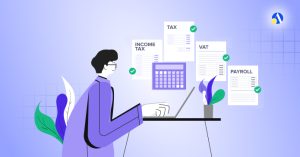As the tax year concludes on April 5th, you will receive several documents from your employer.
As the tax year concludes on April 5th, you will receive several important documents from your employer. One of the most crucial is the P60 form. But what is a P60 and why is it so important for managing your finances in the UK?
This guide will explain the P60 meaning, detail the information it contains, and show you how to get a P60. Understanding your P60 is key to smooth tax management and verifying your income accurately.
What is a P60 in the UK?
So, what is a P60? A P60 form is an annual summary of your earnings and the amount of tax and National Insurance you have paid during a single tax year (6th April to 5th April). If you are employed or receiving a pension on the last day of the tax year, your employer or pension provider is legally required to give you a P60.
This document serves as an official record of your income and deductions, which is vital for several financial activities.
What Information is on a P60?
Your P60 contains a detailed breakdown of your finances for the tax year. Key information includes:
- Personal and Employer Details: This includes your name, National Insurance number, and your employer's PAYE reference number.
- Total Earnings: A summary of your total pay for the year, including your salary, bonuses, and any other taxable income.
- Tax Paid: The total amount of income tax deducted from your pay.
- National Insurance Contributions: Details the contributions you have made towards state benefits like the State Pension.
- Tax Code: The tax code used by your employer to calculate how much tax to deduct.
Why is a P60 Important?
Understanding the purpose of your P60 form can significantly simplify your financial life. Here’s why it’s essential:
- Income Verification: A P60 is an official document used to prove your annual income when applying for a mortgage, loan, or other forms of credit.
- Filing Your Tax Return: If you need to complete a Self Assessment tax return, the information on your P60 is essential for declaring your employment income accurately.
- Claiming a Tax Refund: If you believe you have overpaid tax, your P60 provides the necessary evidence to support your claim for a tax refund from HMRC.
- Checking for Accuracy: It allows you to cross-reference the information with your payslips to ensure your employer has processed your pay and tax correctly throughout the year.
What is the Difference Between a P60 and a P45?
Many people wonder about the difference between a P60 and a P45. While both are important tax forms, they serve different purposes:
- P60: You receive a P60 at the end of each tax year you are employed. It summarises your total pay and tax for that entire tax year.
- P45: You receive a P45 when you leave a job. It details your earnings and tax paid only up to your leaving date within that tax year. Your new employer will need this to put you on the correct tax code.
Frequently Asked Questions about the P60
How to get a P60?
Your employer or pension provider is legally required to give you a P60 by the 31st of May following the end of the tax year. This can be a paper copy or a digital version, often available through an online payroll portal. If you haven't received it by this date, you should contact your employer directly.
What if I lose my P60?
If you lose your P60, your employer can provide you with a replacement copy. It's important to keep your P60s in a safe place, as you may need them for up to six years.
Can I get a P60 if I am self-employed?
If you are a sole trader, you will not receive a P60 because you do not draw a salary through PAYE. However, if you are the director of a limited company and pay yourself a salary, you must issue yourself a P60.
What is a P60 online?
Many employers now issue P60s digitally. A P60 online is a secure, electronic version of the traditional paper form. You can access it through your company's employee portal, download it, and save it for your records. This is more convenient and environmentally friendly.
By understanding what a P60 is and the information it holds, you can take better control of your financial responsibilities and ensure your tax affairs are always in order.
Why Keeping Your P60 is Essential
Retaining your P60, whether in paper or digital format, is essential for accurate record-keeping and financial management. This document serves as a critical piece of evidence for filing tax returns, applying for loans, and verifying income. With HMRC increasingly relying on digital records, being organized with your P60 ensures you're prepared for compliance checks and deadlines. By staying proactive and maintaining proper documentation, you can avoid penalties, make confident financial decisions, and keep your business operations running smoothly.













